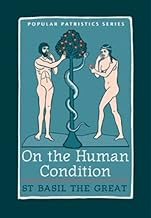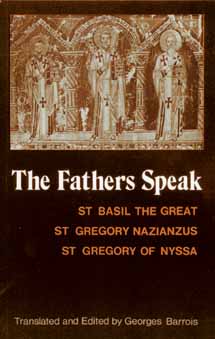Relevant
books
available at Amazon
TEXTS &
TRANSLATIONS
 
St. Basil the Great on the Holy Spirit
(David Anderson - translator)
------
 
Anna Silvas
The Asketikon of St Basil the Great
(Oxford Early Christian Studies)
------
 
On The Human Condition: St Basil the Great (St. Vladimir's Seminary Press
"Popular Patristics" Series) ------
 
Georges Barrois:
The Fathers Speak: St Basil the Great, St Gregory of Nazianzus, St Gregory
of Nyssa
------
 
Basil: The Letters, Volume I, Letters 1-58 (Loeb Classical Library No. 190):
Roy J. Deferrari (Translator)
(Search also for other 3 volumes of Basil's letters.)
------
 
On Social Justice: St. Basil the Great (Popular Patristics):
C. Paul Schroeder
------
 
Monica Wagner, trans., Basil of Caesarea: Ascetical Works, Fathers of the
Church 9
------
Letters, Volume 2 (186-368) [The Fathers of the Church, Volume 28]
Translated by Agnes Clare Way. ------ On the Value of Greek Literature (Greek and English Edition)
N.G. Wilson
------
STUDIES
P.J. FEDWICK: Basil of Caesarea: Christian, Humanist, Ascetic
------
ROBERT C. GREGG: Consolation Philosophy: Greek and Christian Paideia in Basil and the Two Gregories (Patristic Monograph Series of the North American Patristic Society, 3)
------
 
Stephen M Hildebrand:
The Trinitarian Theology of Basil of Caesarea: A Synthesis of Greek
Thought and Biblical Faith
------
 
Augustine Holmes:
A Life Pleasing to God:
The Spirituality of the Rule of Saint Basil (Cistercian Studies)
------
 
Andrew Radde-Gallwitz:
Basil of Caesarea, Gregory of Nyssa, and the Transformation of Divine
Simplicity
(Oxford Early Christian Studies)
------
 
Philip Rousseau:
Basil of Caesarea
(Transformation of the Classical Heritage)
------
|
De Spiritu Sancto, 9
Definitive conceptions about the Spirit which conform to the teaching of the
Scriptures.
22. Let us now investigate what are our common conceptions concerning the
Spirit, as well those which have been gathered by us from Holy Scripture
concerning It as those which we have received from the unwritten tradition of
the Fathers. First of all we ask, who on hearing the titles of the Spirit is not
lifted up in soul, who does not raise his conception to the supreme nature? It
is called “Spirit of God,” “Spirit of truth which proceedeth from the Father,”
“right Spirit,” “a leading Spirit.” Its proper and peculiar title is “Holy
Spirit;” which is a name specially appropriate to everything that is
incorporeal, purely immaterial, and indivisible. So our Lord, when teaching the
woman who thought God to be an object of local worship that the incorporeal is
incomprehensible, said “God is a spirit.” On our hearing, then, of a spirit, it
is impossible to form the idea of a nature circumscribed, subject to change and
variation, or at all like the creature. We are compelled to advance in our
conceptions to the highest, and to think of an intelligent essence, in power
infinite, in magnitude unlimited, unmeasured by times or ages, generous of Its
good gifts, to whom turn all things needing sanctification, after whom reach all
things that live in virtue, as being watered by Its inspiration and helped on
toward their natural and proper end; perfecting all other things, but Itself in
nothing lacking; living not as needing restoration, but as Supplier of life; not
growing by additions; but straightway full, self-established, omnipresent,
origin of sanctification, light perceptible to the mind, supplying, as it were,
through Itself, illumination to every faculty in the search for truth; by nature
unapproachable, apprehended by reason of goodness, filling all things with Its
power, but communicated only to the worthy; not shared in one measure, but
distributing Its energy according to “the proportion of faith;” in essence
simple, in powers various, wholly present in each and being wholly everywhere;
impassively divided, shared without loss of ceasing to be entire, after the
likeness of the sunbeam, whose kindly light falls on him who enjoys it as though
it shone for him alone, yet illumines land and sea and mingles with the air. So,
too, is the Spirit to every one who receives it, as though given to him alone,
and yet It sends forth grace sufficient and full for all mankind, and is enjoyed
by all who share It, according to the capacity, not of Its power, but of their
nature.
23. Now the Spirit is not brought into intimate association with the soul by
local approximation. How indeed could there be a corporeal approach to the
incorporeal? This association results from the withdrawal of the passions which,
coming afterwards gradually on the soul from its friendship to the flesh, have
alienated it from its close relationship with God. Only then after a man is
purified from the shame whose stain he took through his wickedness, and has come
back again to his natural beauty, and as it were cleaning the Royal Image and
restoring its ancient form, only thus is it possible for him to draw near to the
Paraclete. And He, like the sun, will by the aid of thy purified eye show thee
in Himself the image of the invisible, and in the blessed spectacle of the image
thou shalt behold the unspeakable beauty of the archetype. Through His aid
hearts are lifted up, the weak are held by the hand, and they who are advancing
are brought to perfection. Shining upon those that are cleansed from every spot,
He makes them spiritual by fellowship with Himself. Just as when a sunbeam falls
on bright and transparent bodies, they themselves become brilliant too, and shed
forth a fresh brightness from themselves, so souls wherein the Spirit dwells,
illuminated by the Spirit, themselves become spiritual, and send forth their
grace to others. Hence comes foreknowledge of the future, understanding of
mysteries, apprehension of what is hidden, distribution of good gifts, the
heavenly citizenship, a place in the chorus of angels, joy without end, abiding
in God, the being made like to God, and, highest of all, the being made God.
Such, then, to instance a few out of many, are the conceptions concerning the
Holy Spirit, which we have been taught to hold concerning His greatness, His
dignity, and His operations, by the oracles of the Spirit themselves. But we
must proceed to attack our opponents, in the endeavour to confute those
“oppositions” advanced against us which are derived from “knowledge falsely
so-called.”
|

